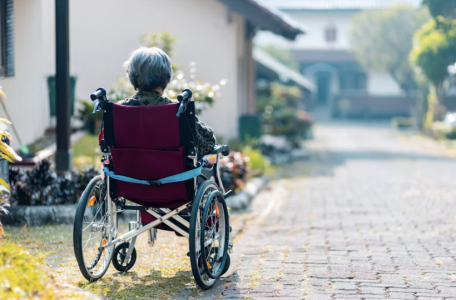Navigating dementia care: the best at-home support options for seniors
- Replies 0
Sometimes the hardest choices are the ones that strike closest to home, especially when they involve the people who once took care of us.
Families across the country are quietly weighing how to give their loved ones the care and dignity they deserve without uprooting their sense of self.
There’s no single roadmap for what comes next, only the shared hope that comfort and safety can coexist under one familiar roof.
As more seniors face the challenges of dementia, many families are turning to in-home care as an alternative to nursing facilities.
Staying in a familiar environment can bring a sense of calm and routine that helps reduce confusion and anxiety, while allowing seniors to maintain some independence.
Caregivers play an essential role in creating that safe, structured space—monitoring symptoms, offering companionship, and ensuring daily tasks are met with patience and consistency.
The emotional bond between a caregiver and their client can also help soften the daily struggles that come with memory loss.

In-home care offers several forms of support, each tailored to different levels of need and comfort. Companion services focus on conversation, social engagement, and mental stimulation through activities like music or crafts.
Personal care provides assistance with bathing, dressing, grooming, and mobility, while homemaker services ensure the home remains clean, organized, and safe.
For those with more advanced dementia, specialized dementia care offers structured routines, behavior monitoring, and coordination with healthcare professionals to maintain dignity and stability.
Respite services provide short-term relief for family caregivers who may be facing burnout after months or even years of continuous care.
Also read: What to know about senior co-ops—and whether they’re right for your next chapter
These temporary caregivers can assist for a few hours or several days, giving families time to rest, handle errands, or simply breathe.
Though respite professionals are not medical providers, they can offer essential support such as companionship, light housekeeping, and daily living assistance.
This balance helps preserve both the caregiver’s well-being and the quality of care the senior receives.
Home care also extends to non-medical assistance that allows seniors to remain active and engaged without leaving the house.
Also read: Retire in Paradise: The Overseas Haven with Elite Healthcare, Low Taxes, and Luxury Living!
Aides can help with mobility, medication reminders, errands, and meal preparation—tasks that might otherwise overwhelm family members balancing work and caregiving.
For many, Medicare and other programs may cover part-time or intermittent services when a senior is considered homebound and in need of skilled nursing.
With the right plan in place, in-home care can transform the challenges of dementia into opportunities for comfort, connection, and peace.
Read next:

Caring for someone with dementia can be one of life’s greatest challenges, but it doesn’t have to be a solitary journey. Families who explore in-home care often discover that help can come with heart, flexibility, and understanding. The key is finding the right balance of support that preserves your loved one’s sense of self while easing the load for everyone involved. Have you considered in-home care for someone you love—what questions or worries still hold you back?
Families across the country are quietly weighing how to give their loved ones the care and dignity they deserve without uprooting their sense of self.
There’s no single roadmap for what comes next, only the shared hope that comfort and safety can coexist under one familiar roof.
As more seniors face the challenges of dementia, many families are turning to in-home care as an alternative to nursing facilities.
Staying in a familiar environment can bring a sense of calm and routine that helps reduce confusion and anxiety, while allowing seniors to maintain some independence.
Caregivers play an essential role in creating that safe, structured space—monitoring symptoms, offering companionship, and ensuring daily tasks are met with patience and consistency.
The emotional bond between a caregiver and their client can also help soften the daily struggles that come with memory loss.

Navigating dementia care: the best at-home support options for seniors. Image source: Steven HWG / Unsplash
In-home care offers several forms of support, each tailored to different levels of need and comfort. Companion services focus on conversation, social engagement, and mental stimulation through activities like music or crafts.
Personal care provides assistance with bathing, dressing, grooming, and mobility, while homemaker services ensure the home remains clean, organized, and safe.
For those with more advanced dementia, specialized dementia care offers structured routines, behavior monitoring, and coordination with healthcare professionals to maintain dignity and stability.
Respite services provide short-term relief for family caregivers who may be facing burnout after months or even years of continuous care.
Also read: What to know about senior co-ops—and whether they’re right for your next chapter
These temporary caregivers can assist for a few hours or several days, giving families time to rest, handle errands, or simply breathe.
Though respite professionals are not medical providers, they can offer essential support such as companionship, light housekeeping, and daily living assistance.
This balance helps preserve both the caregiver’s well-being and the quality of care the senior receives.
Home care also extends to non-medical assistance that allows seniors to remain active and engaged without leaving the house.
Also read: Retire in Paradise: The Overseas Haven with Elite Healthcare, Low Taxes, and Luxury Living!
Aides can help with mobility, medication reminders, errands, and meal preparation—tasks that might otherwise overwhelm family members balancing work and caregiving.
For many, Medicare and other programs may cover part-time or intermittent services when a senior is considered homebound and in need of skilled nursing.
With the right plan in place, in-home care can transform the challenges of dementia into opportunities for comfort, connection, and peace.
Read next:
- Assisted living qualifications: What to expect and who it’s designed for
- Some places might surprise you as the best for seniors living alone
Key Takeaways
- This article explained how in-home care has become a compassionate alternative for seniors living with dementia, offering safety and familiarity within their own homes.
- It discussed the main types of services available, including companion, personal, homemaker, and specialized dementia care options tailored to different levels of need.
- The piece also highlighted respite care as a crucial support for family caregivers, allowing them to rest while ensuring loved ones continue receiving attention.
- Overall, it emphasized how in-home care promotes dignity, independence, and emotional comfort for both patients and their families.






